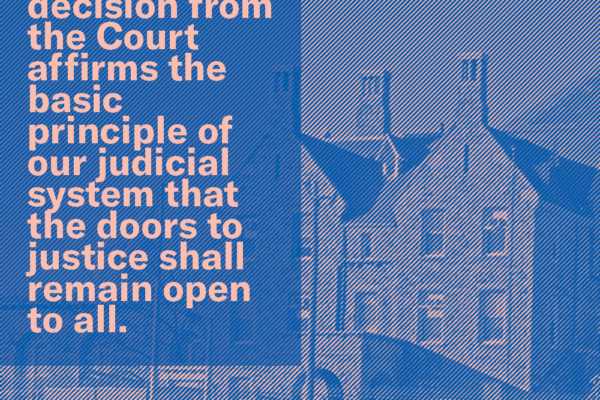Concluding that a 42-year old U.S. Supreme Court decision gave her “no authority to invalidate the Statute as unconstitutional,” U.S. District Judge Mary Lisi today upheld a 107-year-old Rhode Island law that declares inmates serving life sentences at the ACI to be “civilly dead.” The lawsuit, filed last year in U.S. District Court by ACLU volunteer attorney Sonja Deyoe, was on behalf of Woonsocket resident Shelby Ferreira and inmate Cody-Allen Zab, who had been barred from marrying because of the “civil death” law.
Rhode Island remains one of only three states that still has on the books a law like this, whose origins date back to ancient English common law.
In 1974, the U.S. Supreme Court summarily affirmed, without a written opinion, a federal court decision upholding a New York statute barring inmates sentenced to life imprisonment from marrying. However, in the lawsuit decided today, the ACLU had pointed to a more recent U.S. Supreme Court ruling striking down a prison regulation that more generally barred inmates from marrying. In that case, the court held that “inmate marriages, like others, are expressions of emotional support and public commitment” and that a ban on such marriages was “not reasonably related to legitimate penological objectives.” However, Judge Lisi found that case distinguishable and concluded that the 1974 decision “remains binding precedent on this Court.”
As far back as 1937, when 18 states still had civil death laws, a law review article called the concept “outworn.” One court noted that “the concept of civil death has been condemned by virtually every court and commentator to study it” and that such laws had been characterized as “an outdated and inscrutable common law precept” and “a medieval fiction in a modern world.”
ACLU of Rhode Island executive director Steven Brown said today: “This law remains an historical anachronism that belongs on the dustheap of outdated statutes. Prisoners lose many rights, but the fundamental right to marry should not be one of them.” ACLU attorney Dejoe said: “While we understand the Court’s decision, we disagree with it and are discussing what further action if any we should take at this juncture to further this important right.”
A copy of the court decision can be found on the ACLU of RI’s website.

